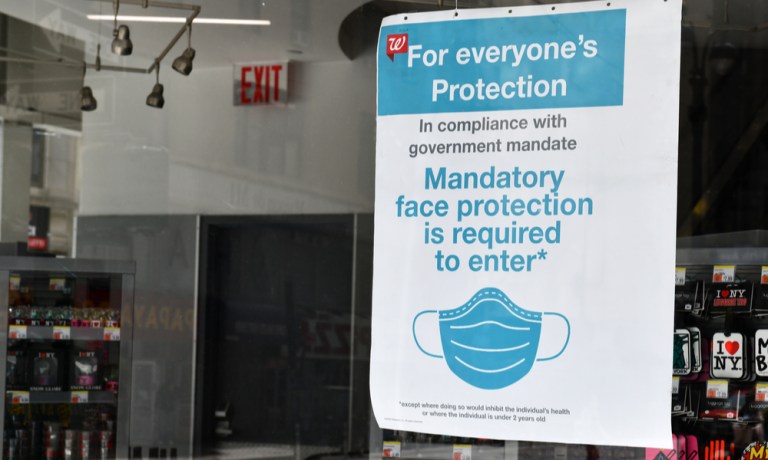
The Retail Industry Leaders Association (RILA) represents some of the biggest retailers in the business. As its role has been magnified during the current crisis, so has that of its president, Brian Dodge. The organization has frequently been in the news as it pushes programs on Capitol Hill and in all 50 state houses, fighting for policy decisions on the Paycheck Protection Program (PPP) and other initiatives, as well as other urgent items as the pandemic presents them.
Last week, Dodge and his team petitioned the National Governor’s Council to mandate mask-wearing. This followed a series of social media-fueled incidents in which store employees were spat on, yelled at and even physically attacked for insisting that customers wear masks.
Dodge says that recent spikes in cases have been a reminder of the importance of mask-wearing, even when it’s not required. The flurry of viral videos and confrontations moved his organization to reinforce the point and to acknowledge that a patchwork approach of county-by-county regulations creates confusion. A letter from the RILA asked governors to set a clear and enforceable rule. Although that coordinated mandate didn’t happen, Dodge says that states have been responsive.
“Texas actually has the ideal structure in place – it’s a statewide mandate for masking when in public or when social distancing isn’t possible,” he told PYMNTS. “The obligation is on the individual to comply; if they fail to do so, they face a $250 fine. Other states have taken a different course, where they put the obligation on businesses. We’re trying to get away from these encounters between customers and employees. When you put the obligation on the business, you’re inviting confrontation.”
While most of the RILA’s efforts have been split between federal and state governments, Dodge expects that the next major action will come from another stimulus package, which will hopefully have more elements aimed directly at retail. He understands that bringing the virus under control and mitigating its effects will be the No. 1 priority for consumers to return to pre-pandemic behaviors. He also cautions his membership to be mindful of outside factors in the recovery, such as ensuring the free flow of credit and access to capital for retailers. And although this may not be a popular topic, Dodge said that he and the organization will fight for some kind of legal barriers to lawsuits related to the pandemic.
He is optimistic about the future, despite the complete crash of offline retail during March and April. Dodge characterizes May and June as exceeding expectations, and credits his members for rapidly innovating to adapt to pandemic regulations and safety.
However, Dodge also realizes that the most important questions are not easily answered, such as how to plan for the rest of 2020. He said he will fight for an issue that hasn’t received much attention of late, which is the “essential” versus “nonessential” retail argument that will accompany any further lockdowns that may be necessary to fight virus spikes.
“We believe strongly that we’ve learned a lot over the last few months, and that we should move away from that arbitrary distinction to save shopping,” Dodge said. “In our blueprint (the RILA’s document on reopening safety), we laid out the practices that are being employed today to keep store environments safe for customers and employees. And we believe that if a store has those practices in place, they should be able to stay open if there’s any kind of resurgence of the virus.
“The ‘essential versus nonessential’ debate is arbitrary,” he continued. “And it’s really in the eye of the beholder. I don’t own pets, so pet stores are not necessarily essential to me, but to others they are. Keeping people safe should be the determining factor, and the business should be able to make the decision about staying open or closing.”
In addition to the overwhelming priority of handling the pandemic, Dodge and his team are (and have been) concerned with what it calls its Asset Protection initiative. The organization is trying to mitigate today’s shoppers’ expectations for a frictionless shopping environment and hassle-free returns with the effort to safeguard products against theft and loss. Asset Protection is the RILA’s effort to find ways to strike the right balance.
The program also covers organized retail crime (ORC), which is a growing problem for the larger retailers that comprise the RILA’s membership. More stolen goods are sold online than ever before, and law enforcement responsiveness is down due to many factors, including budget constraints and rising felony theft levels.
“That was a focus pre-COVID, and the pandemic has only accelerated the trend,” Dodge noted. “Not only do you have people who have been trapped in their houses and are ready to commit crimes with a vengeance, but they’ll also be wearing masks when they do it. Even if you had their pictures in your system before to keep them out of your store, that’s not going to work anymore.
“So a lot of things are playing together to make us concerned about another spike in organized retail crime,” he continued. “We’ll be working with Congress to try to get more accountability for the marketplace sellers and to ensure that they are capturing the kind of information they need to capture, so that if a retailer sees their stolen goods online, they can get them to take it down or identify the seller.”